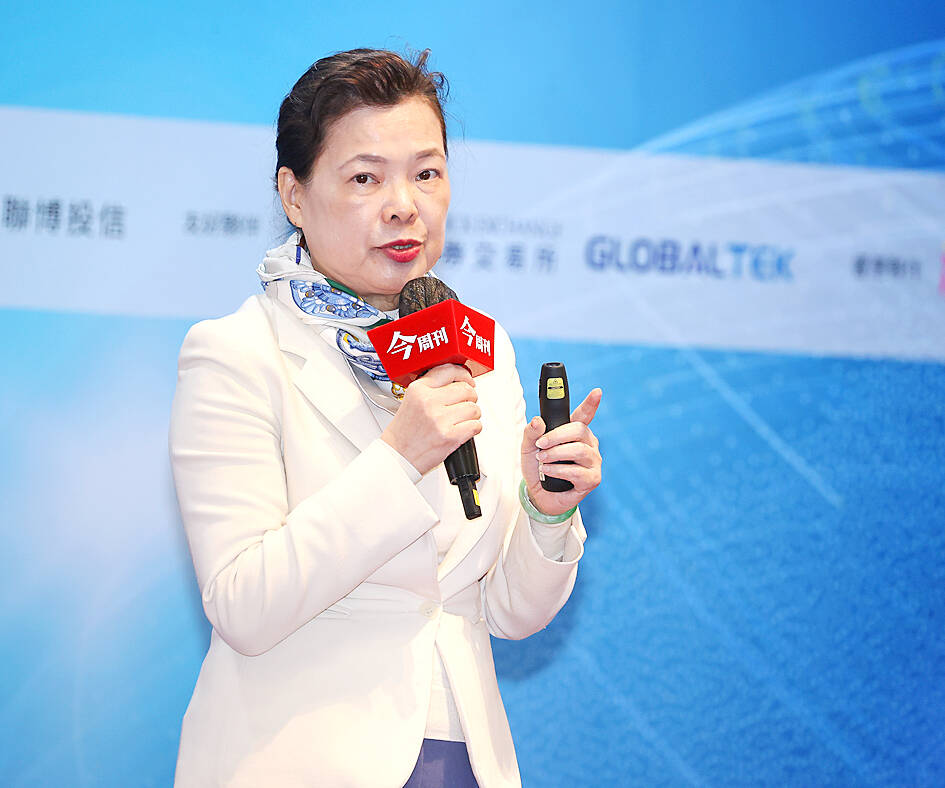The government is working to prepare businesses for the possibility that China could withdraw from its trade agreement with Taiwan, Minister of Economic Affairs Wang Mei-hua (王美花) said, adding that Taiwan is not alone in facing Chinese economic coercion.
In a television interview broadcast on Saturday night, Wang was asked about China announcing the suspension of preferential tariffs on petrochemical products under the Economic Cooperation Framework Agreement (ECFA).
The Chinese Customs Tariff Commission on Dec. 21 last year announced it was suspending preferential tariffs on 12 petrochemical products, including propylene and paraxylene, citing trade barriers imposed by Taiwan on similar products.

Photo: CNA
In addition to Taiwan, Beijing has also use economic coercion against Australia, Canada, Japan, Lithuania and South Korea for its own political ends by leveraging its trade relationships with those countries, Wang said.
Taiwanese exports to China covered by ECFA fell to US$15 billion last year, from US$20.5 billion in 2022, due to China’s economic downturn and its increase in domestic supply in related industries, she said.
“We have discussed with the petrochemical industry in particular and urged them to come up with a long-term plan in response to China’s increase of supply of its own petrochemical industry from the upstream to downstream,” she said.
Taiwan is also not the only country that worries about decreasing petrochemical exports to China, “as with China’s increasing production, the global petrochemical industry also feels the pressure and many worry about it could engage in dumping,” she said.
The government has already held many meetings with other industries covered by the ECFA to help them broaden their client base, Wang said.
Taiwan’s total exports have performed well over the past three years, benefiting from investments by returning Taiwanese businesses due to a US-China trade conflict and from the country’s resilient manufacturing during the COVID-19 pandemic, she said.
The nation’s exports reached US$400 billion annually from 2021 to last year, with a record of US$479.4 billion in 2022, ministry data showed.
On foreign interest, three major companies in the semiconductor industry — ASML Holding NV, Applied Materials Inc and Lam Research Corp — have invested in Taiwan, Wang said.
The government played a facilitating role in securing the three companies’ investments, which would further embed Taiwanese firms in global supply chains, she said.
For example, the land for ASML’s plant in New Taipei City’s Linkou District (林口) required cross-ministerial discussions, and the government also helped in the setup of Applied Materials’ Asian equipment parts logistics center in Taoyuan, aiding in negotiating for the waving of approval for Chinese-made parts not used by domestic companies, she said.
Germany’s Merck Group has also invested in Taiwan, setting up a new semiconductor solutions megasite in Kaohsiung last year, which both the central and local governments worked to facilitate, she said.

CAUTIOUS RECOVERY: While the manufacturing sector returned to growth amid the US-China trade truce, firms remain wary as uncertainty clouds the outlook, the CIER said The local manufacturing sector returned to expansion last month, as the official purchasing managers’ index (PMI) rose 2.1 points to 51.0, driven by a temporary easing in US-China trade tensions, the Chung-Hua Institution for Economic Research (CIER, 中華經濟研究院) said yesterday. The PMI gauges the health of the manufacturing industry, with readings above 50 indicating expansion and those below 50 signaling contraction. “Firms are not as pessimistic as they were in April, but they remain far from optimistic,” CIER president Lien Hsien-ming (連賢明) said at a news conference. The full impact of US tariff decisions is unlikely to become clear until later this month

With an approval rating of just two percent, Peruvian President Dina Boluarte might be the world’s most unpopular leader, according to pollsters. Protests greeted her rise to power 29 months ago, and have marked her entire term — joined by assorted scandals, investigations, controversies and a surge in gang violence. The 63-year-old is the target of a dozen probes, including for her alleged failure to declare gifts of luxury jewels and watches, a scandal inevitably dubbed “Rolexgate.” She is also under the microscope for a two-week undeclared absence for nose surgery — which she insists was medical, not cosmetic — and is

GROWING CONCERN: Some senior Trump administration officials opposed the UAE expansion over fears that another TSMC project could jeopardize its US investment Taiwan Semiconductor Manufacturing Co (TSMC, 台積電) is evaluating building an advanced production facility in the United Arab Emirates (UAE) and has discussed the possibility with officials in US President Donald Trump’s administration, people familiar with the matter said, in a potentially major bet on the Middle East that would only come to fruition with Washington’s approval. The company has had multiple meetings in the past few months with US Special Envoy to the Middle East Steve Witkoff and officials from MGX, an influential investment vehicle overseen by the UAE president’s brother, the people said. The conversations are a continuation of talks that

CHIP DUTIES: TSMC said it voiced its concerns to Washington about tariffs, telling the US commerce department that it wants ‘fair treatment’ to protect its competitiveness Taiwan Semiconductor Manufacturing Co (TSMC, 台積電) yesterday reiterated robust business prospects for this year as strong artificial intelligence (AI) chip demand from Nvidia Corp and other customers would absorb the impacts of US tariffs. “The impact of tariffs would be indirect, as the custom tax is the importers’ responsibility, not the exporters,” TSMC chairman and chief executive officer C.C. Wei (魏哲家) said at the chipmaker’s annual shareholders’ meeting in Hsinchu City. TSMC’s business could be affected if people become reluctant to buy electronics due to inflated prices, Wei said. In addition, the chipmaker has voiced its concern to the US Department of Commerce